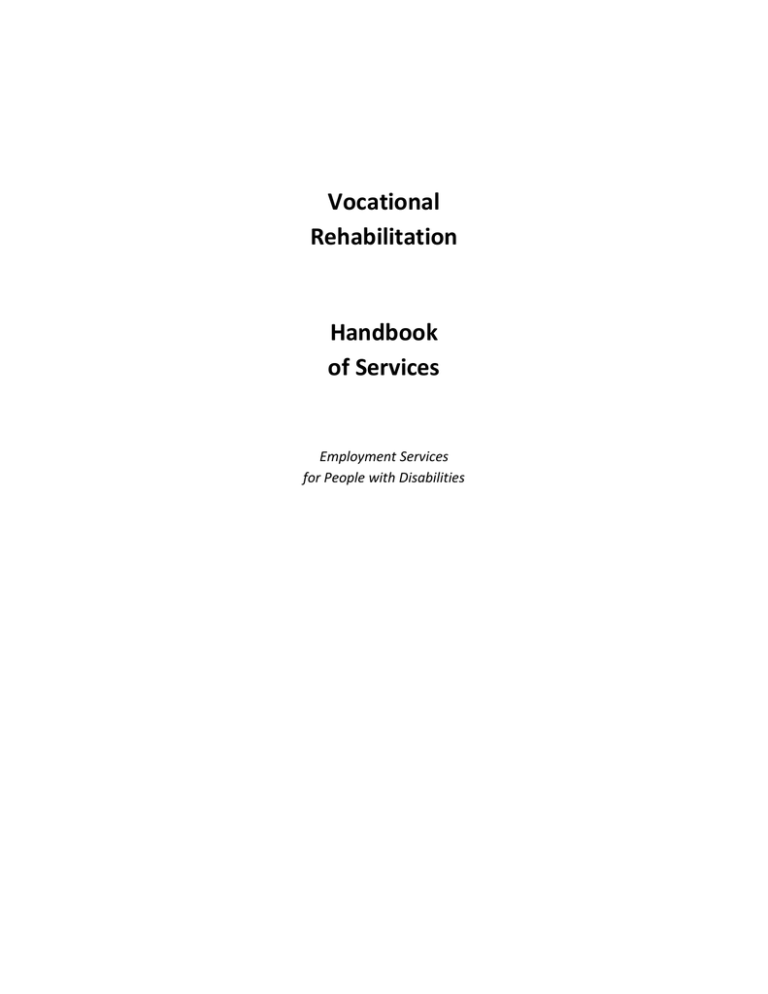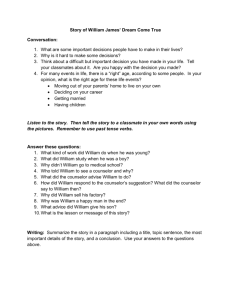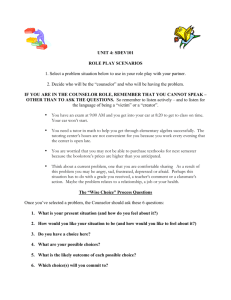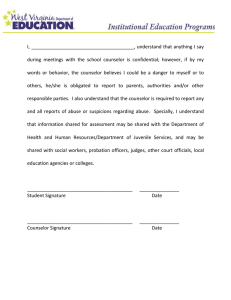Vocational Rehabilitation Handbook
advertisement

Vocational Rehabilitation Handbook of Services Employment Services for People with Disabilities We help people with disabilities find employment. To help Kansas citizens with disabilities meet their employment goals, Kansas Rehabilitation Services (KRS) offers a variety of vocational rehabilitation (VR) services. If you have a disability which impacts your ability to get or keep a job, you may want to apply for VR services. You can apply at the nearest DCF office. For referral to the office serving your community, please call toll-free 1-866-213-9079 or TDD 1-800-4320698. Table of Contents Page 3 - Vocational rehabilitation (VR) at-a-glance Page 4 - How to apply for VR services Page 5 - Confidentiality Page 6 - How do you know if you are eligible for services? Page 6 - Order of selection Page 7 - How are services planned? Page 8 - What VR services are available? A. B. C. D. E. F. G. Counseling and guidance Physical and mental restoration services Training Other services Supported employment Job placement services Services for High School students Page 13 - Your rights and responsibilities A. B. C. Your rights Your responsibilities What if you’re not satisfied? Page 16 - How to contact the Client Assistance Program Page 17 - How to contact us Vocational rehabilitation (VR) at-aglance 1 You apply for services at the nearest DCF/KRS office. More information is also available: • By visiting www.dcf.ks.gov/services/RS/Pages/default.aspx • By calling toll-free 1-888-369-4777. (Relay Center for people with hearing or speech impairments: toll-free 1-800-766-3777) • By visiting a DCF Access Point in your community • By calling toll-free 1-866-213-9079 or TDD 1-800-432-0698 for referral to the office serving your community. 2 We will meet with you to learn more about you, your disability and your abilities. 3 We will collect information about you (such as employment, medical or school records) to determine if you are eligible for services. You may also receive, at no cost to you, diagnostic tests or assessment services needed to help determine if you are eligible. 4 If you are eligible for services, you and your vocational rehabilitation counselor will work together to develop a program of services to help you get a job. You may participate in additional assessments to help you focus on your interests and abilities, and to help identify what services you will need. You and your counselor will prepare an Individualized Plan for Employment (IPE) listing your job goal and the services you will receive. If you prefer, you may work on developing this IPE on your own, or with the assistance of another individual who is willing to help you. Please note In order for KRS to pay for any services, including diagnostic services, the counselor must give written approval BEFORE the service is provided or purchased. This requirement applies to all services or purchases. 5 Services will be provided according to your IPE. The length of this process will vary, depending on your individual situation. 6 When you have completed the services you need, your counselor will help you find a job. Your counselor can guide you, but the primary responsibility to find a job is yours. The more job applications you make, the better your chances. 7 During the first few months that you are employed, your counselor will stay in touch to make sure everything is going well. When your job is stable and you do not need any additional services, your counselor will consider your IPE successfully completed. 8 If you and your counselor think it is necessary, your counselor may check with you periodically to see if you need any services to help you keep your job. How to apply for VR services First, you should contact the nearest DCF/KRS office and state that you want to apply for VR services. We will ask you some questions to learn about your disability and how we can help you get or keep a job. Some questions you will be asked are: • • • • • • • What is your disability? What are your strengths, skills and interests? What doctor or hospital care or treatment have you had for your disability? How does your disability keep you from getting or keeping a job? What kind of work have you done? What kind of work are you interested in doing? What kind of education or experience do you have? What kinds of insurance or other funding do you have which would help pay for the services you need? Confidentiality Throughout the VR process, you will be asked to provide personal information that will help your counselor understand your disability; determine whether you are eligible for services; and assist you in developing and monitoring your plan for employment. Only information that is needed to carry out your plan will be requested. Your counselor and other rehabilitation service providers will keep information about you confidential. You may look at or copy information in your file upon written request. Medical, psychological or other information that may be harmful if released directly to you will only be made available to your representative, a physician, or a licensed/certified psychologist. If your file contains copies of reports or records originally developed by another agency, this information may be released only under the conditions established by the other agency. In most circumstances, we will get your written permission before we release any information about you. However, there are some exceptions when we will release information directly without your written permission. These exceptions are when: • • • • • • • Required by federal law. Required for law enforcement, fraud or abuse investigations. Required by the Child Support Enforcement program. Required by a court order. Required to protect you or others from a threat to safety. Required for administration of the VR program. Required to coordinate services for you with other programs in the Kansas Department for Children and Families (DCF) Your counselor can discuss this policy with you if you have any questions. How do you know if you are eligible for services? To receive VR services, you must meet all three parts of the following eligibility requirements: 1. You must have a physical or mental impairment or disability; and 2. Your disability must result in a substantial impediment to employment; and 3. Your must require VR services to prepare for, secure, retain or regain employment. Individuals who are eligible for Supplemental Security Income (SSI) or Social Security Disability Income (SSDI) are presumed to be eligible for VR services. Your financial resources will not affect eligibility. However, whether KRS will pay for certain services will usually depend on whether you meet economic need guidelines. (This rule does not apply to persons who are eligible for SSI or SSDI.) In determining whether you are eligible, we will use existing information as much as possible. This information could include employment, medical or school records; information from Social Security; or information you and your family provide. We may also request additional information needed for our preliminary assessment. For example, if needed, your counselor may ask you to get an up-to-date medical exam. Also, special medical exams, such as eye or hearing tests, may be needed. Medical and vocational assessments required to determine eligibility will be provided at no cost to you. Your assistance in providing needed information and keeping all scheduled appointments will be appreciated. Your counselor will let you know if you are eligible as soon as possible. Determination of your eligibility should be completed within 60 days of your application unless you agree to an extension. Order of selection With the costs of medical, training and other services continuing to climb, it is possible that KRS will not have sufficient resources to serve all eligible persons who apply. If this situation occurs, an order of selection procedure will be used to determine priorities for access to services. All eligible clients will be assigned to one of several service categories. The highest priority categories will be for persons with the most significant disabilities, in compliance with federal law. Factors considered in assigning an individual to an order of selection category will be: • • • The number of services you will need to achieve employment; How long services are expected to last; and The functional limitations caused by your disability. If it is necessary to manage access to services, a waiting list will be maintained by the date we received your application in each closed category. People on the waiting list will be notified when services can be provided. Order of selection procedures will not affect individuals who already have finalized IPEs. Persons who need post employment services will not be affected. How are services planned? If you are eligible for services, you and your counselor will work together to develop an IPE. You may also work on developing your IPE on your own or with the assistance of another individual who is willing to help you. Your IPE will list your job goal, the services you will receive, when you will receive the, and how your progress will be measured. The services will be designed according to your unique needs, therefore not all clients will receive the same services. To help you focus on your interests and abilities and to help determine the services you will need to achieve employment, you may participate in vocational assessments or evaluations before setting up your IPE. Such assessments can help you find out what kind of jobs you would be good at and what jobs you might like. Some examples are: • • • • Counseling, which involves talking with your counselor about what work you have done and what jobs are best for you. Career exploration, through which you can learn about the job market and your interests. Work sampling, which helps you become more familiar with different types of jobs. Community-based work assessments, which are done while you are actually working on a job. Your employment interests are very important in setting up your IPE. You will have the opportunity to learn about employment options and to choose goals and services that fit your strengths, abilities and preferences. Your IPE is the plan for your employment future and you should be actively involved in developing it. Both you and your counselor must sign your IPE. Your IPE can be changed. At least once a year your IPE should be reviewed with you to see if it is still the best plan to help you get a job. What VR services are available? All eligible clients will receive vocational counseling and guidance at no cost. The other services that will be provided will depend on your individual circumstances and will be listed on your IPE. Payment for some services will be based on financial need guidelines. You will be expected to help pay for your rehabilitation program according to your ability to do so. (This rule does not apply to people who are eligible for SSI and SSDI.) Counseling and guidance Counseling and guidance is a major service provided by KRS. Your counselor will talk with you, advise you and help you to plan for employment. Some examples of counseling services are: • • • • Help in learning about your disability, abilities, aptitudes and interests. Help in choosing work goals, based on your preferences, results of your vocational assessments and the availability of jobs. Help in planning to reach your employment goals. Help in learning about jobs, education, health services, and community programs. Important reminder Remember, KRS must approve payment of services listed on your IPE before the services are provided or purchased. The approval must be in writing from your counselor. Some equipment can be purchased only through State bidding procedures. Physical and mental restoration services The physical and mental restoration services that may be provided by KRS must directly relate to your ability to get or keep a job. Such services include: • • • • • • Prosthetic and orthotic devices, such as artificial limbs or braces and dentures. Corrective surgery or treatment, including outpatient care. Eyeglasses and visual services. Dentistry Diagnosis and treatment for mental and emotional disorders. (Inpatient drug/alcohol treatment is generally limited to a maximum of 25 days.) Special services including: • Speech therapy to help you understand and overcome speech problems. • Physical and occupational therapy to help you develop physical abilities and teach you how to use such things as braces, wheelchairs, crutches and other devices if you need them • Nutritional services to help you develop an individualized diet for special health problems that interfere with employment. Training If you need training to get or keep a job, your counselor can tell you more about the different kinds of training offered. Generally, there are several types of training programs available: WORK SKILLS TRAINING: Sometimes you might have trouble adjusting to work, or returning to work after an accident. This may be because you don’t have enough confidence in yourself. You may have trouble getting along with other people at work. You may have some habits that cause problems at work, like not doing things on time. If you have these kinds of issues, KRS may refer you to a work skill program. This kind of training can help you learn to be successful on-the-job. DAILY LIVING SKILL TRAINING: Instruction may be given on a variety of topics, including: • Communication skills. • Orientation and mobility skills. • Self-care skills. • Use of community resources and agencies for health, recreation and leisure, education and transportation services. VOCATIONAL TRAINING: In some cases, you may need to learn specific skills to reach the vocational goal listed on your IPE. This training may be provided on-the-job or at technical/trade schools, colleges or universities. If your plan includes training, it is up to you to do the best you can. If you have problems with the training or adjusting to it, you must talk with your counselor about it. If you are receiving training, you must: • Apply for PELL grants or other available financial aid. Use these grants or funds, if you receive them, to help pay for training costs. • Maintain a satisfactory performance level as agreed to by you and your counselor. • Provide a copy of your grades to your counselor at the end of each semester or quarter. Keep in touch with your counselor throughout your training. ON-THE-JOB TRAINING in business or industrial settings may also be arranged to help you achieve specific employment objectives. This type of training must be agreed to by you, your counselor and the employer. Other services Other important items or services can be provided through KRS, if you need them for a job. These items or services may include: • Books, equipment, tools, supplies, licenses and stock needed to begin work. • Reader, interpreter and tutor services. • Personal assistance services. • Rehabilitation technology to change a work site, or provide you with an adaptive device, to help reduce barriers to employment. • Telecommunications, sensory and other technological aids and devices, such as hearing and optical aids. KRS may also help you arrange transportation during your training, or pay relocation and moving expenses if needed to help you get a job. Sometimes KRS can help with living expenses, such as room and board, child care and travel expenses, if no other financial resources are available and if your expenses have increased as a result of your participation in VR services. KRS will also refer you to other agencies and programs to help you get the services you need. Supported employment Supported employment gives people with the most significant disabilities opportunities for employment in competitive, integrated work settings. Intensive training is provided while you’re learning the job. Then long-term ongoing support is provided to help you keep the job. If your disability has prevented you from working, or if you need long-term support services to keep a job, supported employment may be an option for you. Please check with your counselor for additional information. Job placement services The goal of KRS is to help you get or keep a job. Your counselor, a job placement specialist, or another service provider may show you how to fi ll out application forms or help you prepare for job interviews. Your counselor can also provide help in lessening obstacles that interfere with your ability to get or keep a job. For example, special accommodations can be made for transportation or in the equipment you will use in your job. Please remember—your counselor can guide you, but you have the primary responsibility to find a job. It is important that you participate actively in looking for employment. After you begin to work, your counselor will want to be sure that you and your employer are satisfied and see if you need any help in staying on the job. When your job is stable and you do not need any additional services, your counselor will contact you to close your case. Services for high school students VR services may also be available to help high school students with disabilities prepare for employment after leaving school. For more information or to apply, contact your nearest DCF office. Or you may call toll-free 1-866-213-9709 or TDD 1-800-432-0698 for referral to the office serving your community. Your rights You have the right to: • Apply for services. • Receive a fair and complete assessment to determine if you are eligible and, if eligible, to receive other VR services without regard to your disability, race, creed, color, religion, age or sex. • Expect that all information you give your counselor, or information your counselor learns about you from other sources, will be kept confidential and used only for your plan for employment. • Take an active part in planning your IPE and be involved in any change in that plan before it goes into effect. • Request an administrative review or fair hearing if you are not satisfied with KRS services. Contact your counselor or the Client Assistance Program to learn about this appeal process. Your responsibilities You have the responsibility to: Be open and honest with your counselor in talking about your disability, your education, experience, and ability to help in your own rehabilitation. • Follow medical or other professional instruction. • Take an active part in developing your IPE with your counselor so that both of you agree on what is needed. • Use family funds, insurance, Social Security, PELL Grants, scholarships or any other funds you know about and may be eligible for to help pay for any services you can afford. • Get written approval before you buy anything listed on your IPE that you want KRS to pay for. • Contact your counselor when anything important has happened which may change your plan, and if your address, income or employment have changed. • Attend planned activities and make acceptable grades or ratings if your plan includes training. • Actively seek employment, and let your counselor know if you get a job or if there are any other important changes in your employment. • Keep all appointments. Contact your counselor if you need to change an appointment time or reschedule a missed appointment. This contact will help prevent service delays and show that you are interested in completing your plan and achieving employment. What if you’re not satisfied? Your counselor will work hard to make sure you are satisfied with KRS services. However, if you do not agree with a decision or have a problem, there are several steps you can take. 1. Discuss the problem with your counselor. Sometimes problems are caused by a misunderstanding. If your problem can’t be worked out by talking to your counselor, you may contact the counselor’s supervisor. 2. You may also request assistance by contacting the Customer Relations Representative at the Rehabilitation Services Administrative Office at 785-368-7471 or toll-free 1-866-213-9079. 3. If you have tried to resolve the problem with your counselor, the counselor's supervisor, and you continue to be dissatisfied, you may contact the Client Assistance Program by calling 1-877-7761541 (Toll Free), 1-877-335-3725 (Toll Free TDD) or 785-273-9661. The Client Assistance Program can help answer your questions about KRS and can help you find solutions to problems that may arise. 4. If you are unable to resolve the problem with your counselor, the supervisor and the Client Assistance Program, several administrative options are available. These options are: an exception to policy granted by the Director of Rehabilitation Services; an administrative review conducted by a KRS supervisor who has not been involved in your rehabilitation program; mediation; or a fair hearing. 5. If your concerns are not resolved after a fair hearing, you have the right to request a review by the State Appeals Committee, or you may file a law suit in District Court. Each of these options has different procedures. If you want to learn more about these options, or request assistance in selecting the option that would be most effective for your situation, please contact your counselor or the KRS supervisor in your area, or you may contact the Client Assistance Program. How to contact the Client Assistance Program Disability Rights Center of Kansas 635 SW Harrison Street, Suite 100 Topeka, KS 66603 toll-free 1-877-776-1541 toll-free TDD 1-877-335-3725 785-273-9661 Email: info@drckansas.org Website: www.drckansas.org How to contact us Contact your nearest DCF Office by calling toll-free 1-888369-4777. To find the name of the counselor and office location serving your county please visit: http://www. dcf.ks.gov/services/Pages/mapvr.aspx People with hearing or speech disabilities may use the Relay Center toll-free at 1-800-7663777. Stop by a DCF Access Point in your community for more information. You may call toll-free 1-866-213-9079 or TDD 1-800-4320698 for referral to the office serving your community. For more information, please visit us at http://www. dcf.ks.gov/services/RS/ Rehabilitation Services To request a copy of this publication in Braille, large print or other media of choice, please call (785) 368-7471. Kansas Rehabilitation Services (KRS) does not discriminate on the basis of race, color, gender, sexual orientation, gender identity, religion, national origin, ancestry, age, military or veteran status, or disability in acceptance for services or employment. For more information on this policy, please contact KRS at the address listed above. Services listed in this Handbook are provided under the authority of the Rehabilitation Act of 1973, as amended. If you have any questions about these services or your rehabilitation program, please contact your counselor toll-free at 1-888-369-4777. Persons who are deaf, hard of hearing, or speech impaired may contact us through the Relay Center, toll-free 1-800-7663777. MAS 3/11 Revised 6/12


